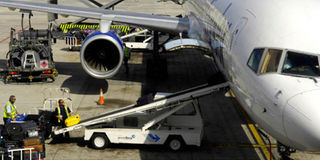Does sale of Enhas shares affect new Uganda Airlines?

On the morning of last Tuesday, Ugandans woke up to the news that the Minister for Foreign Affairs, Mr Sam Kutesa, had sold off his shares in Entebbe Handling Services (Enhas) to a group of businessmen from the United Arab Emirates.
Mr Kutesa is a businessman and it is very much within his rights to sell off shares in any of his business holdings, but the timing had coincided with government’s plans to revive Uganda Airlines, which was until the early 1990s the cargo handler at Entebbe International Airport.
The question for most Ugandans is what happens to government’s plans to revive Uganda Airlines? Will they not be affected? State Minister for Transport, Mr Aggrey Bagiiire does not think so.
Mr Bagiire says government has since hired a consortium of people, including former and retired pilots, flight engineers and former airlines administrators to help it work out a business plan. The plan, he says, will include decisions on issues such as whether government will fully own the flag career or have partners; whether to make the airline regional or international; whether to hire, lease or purchase aircrafts; and where to purchase in case a decision to purchase has been taken.
Almost there
“We are coming to the tail end of that stage. We hope a report will be out by Christmas. The question of when we get started will depend on the recommendations that government will choose to adopt,” he says.
Major airlines the world over run handling operations. British Airways does at Gatwick and several other airports in the United Kingdom and so does so KLM Royal Dutch Airlines at Amsterdam Schiphol Airport. The same applies to Kenya and Rwanda’s flag carriers, where Kenya Airways and Rwanda Air run similar operations at Jomo Kenyatta and Kigali International airports, respectively.
To understand the importance of cargo handling to a national airline, one has to look at Kenya Airways’ balance sheet. Despite competition from others such as Aircare, Kenya Aerotech and Swissport Kenya, cargo handling has been contributing at least two per cent of Kenya Airways annual turnover and with very limited inputs.
According to the published books of accounts for the year ending March 2016, in the year 2014, Kenya Airways made a turnover of Kshs106.009b (about UShs3.6 trillion) out of which Kshs1.9billlion, about 1.8 per cent of the revenue, was from handling charges.
In 2015, turnover rose to Kshs110.161b out of which handling contributed Kshs2.08b or 1.8 per cent. In 2016, the turnover rose to Kshs116.122b, with handling bringing in Kshs2.33b, about 2 per cent of the revenue.
Handling operations are, therefore, considered one of the hassle-free ways through which a revived Uganda Airlines is expected to generate revenue. So where do the movements at Enhas leave Uganda Airlines?
Two former pilots turned politician and businessman, Mike Mukula and Edward Francis Babu, respectively, say Minister Kutesa’s decision to sell his stake in Enhas will have no effect on Uganda Airlines’ business prospects.
“There is no implication at all. The Airline will set up its own cargo handling company. They will only be competitors (with Enhas and DAS),” Mukula says.
Minister Bagiire prefers to add a service delivery angle to the argument.
“Entebbe is being expanded and when you reach there at peak hours, you cannot help but sympathise with the service providers. Inevitably, there is need for expansion and competitiveness. So Enhas having sold to another firm can only mean improved service delivery.
It cannot have any effect on the operations of the proposed airline” Mr Bagiire says.
Despite assurances from Mr Bagiire, Capt Babu and Capt Mukula, Ugandans remain apprehensive. One just has to look at the volumes of posts on social media to appreciate the levels of apprehension.
That is understandable given that Enhas is not just any other company in the ground handling business. Its history is so controversially intertwined with that of the defunct Uganda Airlines that many Ugandans cannot stop asking questions about the impact of its change of ownership at a time when plans to revive Ugandan Airlines are in very advanced stages.
Background
Uganda Airlines had had a monopoly of the ground handling operations in Entebbe until 1993, when Civil Aviation Authority (CAA) liberalised the operations.
Two years later, CAA terminated Uganda Airlines’ contract and granted Enhas a monopoly of the ground handling services.
Uganda Airlines was initially one of the partners in Enhas, with a 50 per cent stake, while Sabena Airlines held 5 per cent, CAA and UAC workers held 5 per cent and 40 per cent was held by two companies – Effortes, a subsidiary of Caleb International (owned by Gen Salim Saleh) and Global Airlink (owned by Mr Sam Kutesa). In 1998, Uganda Airlines was “forced to sell” its shares to ostensibly pay off some debts. The shares were bought by Effortes.
The wheeling and dealing culminated into Parliament’s decision early in March 1999 to censure Mr Kuteesa, who was then Investment minister, for alleged influence peddling and misuse of office. Movers of the motion accused Mr Kutesa of conflict of interest on the grounds that he held a Cabinet portfolio while at the same time presiding over Enhas, which contravened the Leadership Code of Conduct.




